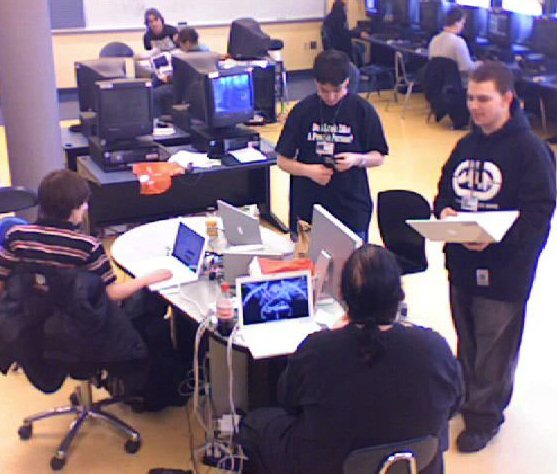
Subject: Global History
Grade Level: 9-10
How it Works: Given choices, students decide what themes in Global History they would like to explore. In teams, they write scripts and later create videos incorporating appropriate graphics. Students will watch these Global History videos and follow the instructions within them. These videos are geared to the concepts students need to learn. Students should use outside information from different sources to help them complete their tasks. Research on topics the teacher provides will keep the students focused on appropriate content. This activity is also an excellent way to review content that you have taught.
Final Project/Product: Videos are posted online for all students to view. The videos that are created may be shared with other students who want to study the same topics. Students become the experts in their fields and teach others through their videos.
Overall Value: Students are in charge of their learning. Going through all stages, from research to video production, develops both technology and subject area skills. Team work and cooperation are by-products of an atmosphere that encourages students to draw upon their interests and talents to create a team product. The element of exploring students' learning styles helps them apply their study skills to other content areas.
Tips for the Teacher: This project was done with students who were repeating the global studies classes, having failed in the traditional classroom. Their level of interest in taking charge of their learning was easily visible in the classroom. Students often spent their lunch hours or after school time in the computer room in order to complete their projects. Some students became experts on particular software and taught others, thereby developing skills that they may use in the future as they seek employment.
Link to Grant Project: http://extendedhs.org/regents_global/index.html
|
| Integrated Learning: Students will demonstrate how academic knowledge and skills are applied in the workplace and other settings. |
| Grade: Commencement Subject: Career Development and Occupational Studies |
| Students will use a variety of intellectual skills to demonstrate their understanding of major ideas, eras, themes, developments, and turning points in world history and examine the broad sweep of history from a variety of perspectives. |
| Grade: 9-10 Subject: World History |
| Students will use a variety of intellectual skills to demonstrate their understanding of the geography of the interdependent world in which we live—local, national, and global—including the distribution of people, places, and environments over the Earth’s surface. |
| Grade: 9-10 Subject: Geography |
| Use a variety of intellectual skills to demonstrate their understanding of how the United States and other societies develop economic systems and associated institutions to allocate scarce resources, how major decision-making units function in the U.S. and other national economies, and how an economy solves the scarcity problem through market and nonmarket mechanisms. |
| Grade: 9-10 Subject: Economics |
| Students will use a variety of intellectual skills to demonstrate their understanding of the necessity for establishing governments; the governmental system of the U.S. and other nations; the U.S. Constitution; the basic civic values of American constitutional democracy; and the roles, rights, and responsibilities of citizenship, including avenues of participation. |
| Grade: 9-10 Subject: Civics, Citizenship, and Government |
| Students will use a variety of intellectual skills to demonstrate their understanding of major ideas, eras, themes, developments, and turning points in the history of the United States and New York. |
| Objectives |
| Students will focus on the content themes they will be researching. |
| Students will research using a variety of resources, both print and media. |
| Students will create scripts to narrate short student-created videos. |
| Students will incorporate graphics into their videos using a variety of graphics and editing programs. |
| Students will share their videos with other students who have researched different topics. |
| Materials |
| Computer |
| Internet |
| Books |
|
| Procedure 1 |
| Expose students to themes you wish to study from the syllabus. A KWL (Know, Want to Know, Want to Learn) chart will be helpful in accessing students prior knowledge. |
| a. After reviewing the topics and themes, brainstorm what might make a good movie. |
| b. Form teams. Each team will tackle a concept and write a brief script that explains this concept. |
| c. Teams decide which graphics would enhance their movies. |
| d. Students should use a variety of resources to research their topics. It is preferable that you supply trusted web sites rather than have students navigate on their own. They may waste time or locate inappropriate web sites. |
| Regents Prep Student Website http://extendedhs.org/regents_global/index.html |
| Procedure 2 |
| Students will videotape a team member reading their script. |
| a. Students use a variety of graphics programs to create moving pictures that illustrate their concepts. |
| b. Using editing equipment, students will create subtitles that will enhance the points being made. |
| c. Students will navigate on the internet to finish their projects. |
| d. Students will review their videos for clarity and edit as necessary. |
| Oswego City Exam Prep Center http://regentsprep.org/ |
| Procedure 3 |
| Students will post the videos online. |
| a. Students view each others videos and offer feedback for clarity. |
| Wikipedia is a free, online encyclopedia where users can change information as they wish. Usually a reputable resource, but you must check information. www.wikipedia.org |
| Procedure 4 |
| Students will share their videos so others can use them for study purposes. |
| a. Making videos available online allows students to become independent and self-guided. |
| b. Students can replay videos as many times as necessary until they feel confident in understanding a concept. |
| Edusolution.com contains links to exams, lesson plans, atlas and map programs, and much more. Edusolution.com |
| Procedure 5 |
| Notes to the teachers: The above lesson may be done over several days or weeks. Editing could be done outside of class and with the cooperation of a computer lab teacher if necessary. |
| a. Students can practice exam questions related to the topics they researched. |
| b. Students can create exam questions for each other employing the format of the Regents exam. |
|
| Extension |
| The videos make their creators experts on their selected topics. Sharing videos builds community spirit. Students can use each other’s work to review difficult concepts. Making videos available online allows people to go back and review as many times as they need. |
| Assessment |
| After creating and watching videos, students should practice with questions created in a format similar to their exams. |
|
| Day 2: Reflecting: How Do Your Students Learn Best? |
| Objectives |
| Students will write a reflection on the process of researching and creating a movie. |
| Students will take a learning styles inventory to determine the modality they prefer. |
| Students will reflect on how this process enhanced their learning. |
| Students will apply this self-knowledge to other learning situations. |
| Materials |
| Computer |
| Internet |
| VARK survey |
|
| Procedure 1 |
| After watching other students' videos, students will write brief summaries of the main idea of each movie. |
| a. In discussion or in writing, students will analyze what information they retained and how researching, creating, and viewing movies helped. |
| b. Students will take a learning styles inventory that helps them determine the modality they prefer. An explanation of each category is given for the teacher describing VARK. |
| c. In discussion or in writing, students should explore how they can apply this knowledge about themselves to other areas of study. |
| VARK: A Guide to Learning Styles (Ages 12-18) http://vark-learn.com/english/page.asp?p=younger |
| Procedure 2 |
|
| Project Web Site http://extendedhs.org/regents_global/lesson3/page1.html |
|
|

Michael Klein
mklein9@schools.nyc.gov
Information Technology High School
21-16 44th Road
Long Island City, NY 11101
Born and raised on comic books, cartoons, action figures, and science fiction novels, he spent his life reading legends and myths made especially for youth. He attended the School of Visual Arts in New York City where he majored in Cartoons & Animation. |